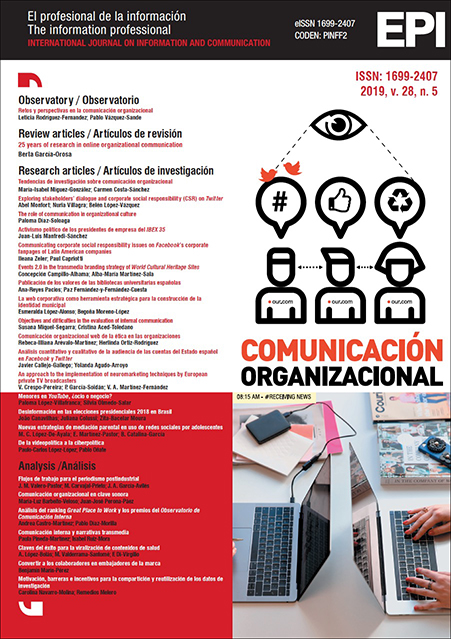The role of communication in organizational culture. Is there a pattern in Spanish fashion companies?
DOI:
https://doi.org/10.3145/epi.2019.sep.06Palabras clave:
Organizational culture, Organizational communication, Corporate communication, Internal communication, Intangible management, Labour climate, Creative industries, Fashion, Corporate identity, Companies, Managers.Resumen
The link between organizational culture and efficiency has been widely studied in academia as there is great interest in finding out whether strong and balanced cultures lead to better long-term performance. The aim of this article is to carry out a preliminary analysis of the internal culture of the Spanish fashion sector, focusing particularly on communication as a driving force behind this process. With regard to methodology, we opted for applying an initial factor analysis of the opinions of seven experts and a subsequent one with 40 executives and middle managers in the sector. The findings show that the type of culture in the Spanish fashion companies studied, depends on a range of factors, the role of communication being worth highlighting in the case of the experts, while in the case of executives and middle managers, the so-called emotional salary stands out as an important factor.Â
Â
Descargas
Citas
Cameron, Kim S.; Quinn, Robert E. (2006). Diagnosing and changing organizational culture: Based on the competing values framework. San Francisco, CA: Wiley. ISBN: 978 1 118 04705 7
Cújar-Vertel, Angélica-del-Carmen; Ramos-Paternina, Carlos-David; Hernández-Riaño, Helman-Enrique; López-Pereira, Jorge-Mario (2013). "Cultura organizacional: evolución en la medición". Estudios gerenciales, v. 29, n. 126, pp. 350-355. https://dialnet.unirioja.es/servlet/articulo?codigo=5444978
Denison, Daniel R.; Neale, William (1994). Denison organizational culture survey. Ann Arbor: Aviat.
Denison, Daniel R.; Spreitzer, Gretchen M. (1991). "Organizational culture and organizational development: a competing values approach". In: Woodman, Richard W.; Pasmore, William A. (eds.). Research in organizational change and development, v. 5. pp. 1-21. https://www.denisonconsulting.com/sites/default/files/documents/resources/denison-1991-competing-values-approach_0.pdf
Garmendia, José-Antonio (2006). "El impacto de la cultura en los resultados". Revista española de investigaciones sociológicas, v. 108, n. 4, pp. 75-96. http://www.reis.cis.es/REIS/PDF/REIS_108_051168422508981.pdf
Greffe, Xavier (2006). Managing creative enterprises. Creative industries - Booklet n. 3. WIPO. https://www.wipo.int/edocs/pubdocs/en/copyright/938/wipo_pub_938.pdf
Gregory, Brian T.; Harris, Stanley G.; Armenakis, Achilles A.; Shook, Christopher L. (2009). "Organizational culture and effectiveness: A study of values, attitudes, and organizational outcomes". Journal of business research, v. 62, pp. 673-679. https://doi.org/10.1016/j.jbusres.2008.05.021
Hartnell, Chad A.; Yi-Ou, Amy; Kinicki, Angelo (2011). "Organizational culture and organizational effectiveness: A meta-analytic investigation of the competing values framework´s. Theoretical suppositions". Journal of applied psychology, v. 96, n. 4, pp. 677-694. https://doi.org/10.1037/a0021987
Hernández-Sampieri, Roberto; Méndez-Valencia, Sergio; Contreras-Soto, Ricardo (2014). "Construcción de un instrumento para medir el clima organizacional en función del modelo de los valores en competencia". Contaduría y administración, v. 9, pp. 229-257. http://www.redalyc.org/articulo.oa?id=39529381010
Johns, Gary (2006). "The essential impact of context on organizational behavior". Academy of management review, v. 31, n. 2, pp. 386-408. https://doi.org/10.5465/amr.2006.20208687
Levay, Charlotta (2010). "Charismatic leadership in resistance to change". The leadership quarterly, v. 21, pp. 127-143. https://doi.org/10.1016/j.leaqua.2009.10.010
Modaes.es (2018). "La moda consolida su peso en la economía española: defiende el 2,9% del PIB". Modaes.es, 14 Dec. https://www.modaes.es/entorno/la-moda-consolida-su-peso-en-la-economia-espanola-defiende-el-29-del-pib.html
Modaes.es (2019). "El empleo en la moda continúa a la baja y cierra enero con una caída del 1,1%". Modaes.es, 4 Feb. https://www.modaes.es/entorno/el-empleo-en-la-moda-continua-a-la-baja-y-cierra-enero-con-una-caida-del-11.html
Naranjo-Valencia, Julia C.; Jiménez-Jiménez, Daniel; Sanz-Valle, Raquel (2011). "Innovation or imitation? The role of organizational culture". Management decision, v. 49, n. 1, pp. 55-72. https://doi.org/10.1108/00251741111094437
Ojeda-Hidalgo, José-Felipe; Méndez-Valencia, Sergio; Hernández-Sampieri, Roberto (2016). "El liderazgo y su relación con el Modelo de Valores en Competencia". Telos. Revista de estudios interdisciplinarios en ciencias sociales, v. 18, n. 1, pp. 17-38. https://dialnet.unirioja.es/descarga/articulo/5655381.pdf
Quinn, Robert E.; Rohrbaugh, John (1983). "A spatial model of effectiveness criteria: Towards a competing values approach to organizational analysis". Management science, v. 29, n. 3, pp. 363-377. https://www.jstor.org/stable/2631061
Schein, Edgar H. (1988). La cultura empresarial y el liderazgo. Una visión dinámica. Barcelona. Plaza & Janes Editores. ISBN: 84 01 36107 9
Schein, Edgar H. (1990). "Organizational culture". American psychologist, v. 45, n. 2, pp. 109-119. https://pdfs.semanticscholar.org/a3bf/4d014c4412f98a2b64d954e29cb9ecaa91ce.pdf
Verheyden, Mark (2017). "Social media and the promise of excellence in internal communication". Journal of organizational ethnography, v. 6, n. 1, pp. 11-25. https://doi.org/10.1108/JOE-09-2016-0020
Wilderom, Celeste P. M.; Van-den-Berg, Peter T.; Wiersma, Uco J. (2012). "A longitudinal study of the effects of charismatic leadership and organizational culture on objective and perceived corporate performance". The leadership quarterly, v. 23, pp. 835-848. https://doi.org/10.1016/j.leaqua.2012.04.002
Descargas
Archivos adicionales
Publicado
Cómo citar
Número
Sección
Licencia
Condiciones de difusión de los artículos una vez son publicados
Los autores pueden publicitar libremente sus artículos en webs, redes sociales y repositorios
Deberán respetarse sin embargo, las siguientes condiciones:
- Solo deberá hacerse pública la versión editorial. Rogamos que no se publiquen preprints, postprints o pruebas de imprenta.
- Junto con esa copia ha de incluirse una mención específica de la publicación en la que ha aparecido el texto, añadiendo además un enlace clicable a la URL: http://revista.profesionaldelainformacion.com
La revista Profesional de la información ofrece los artículos en acceso abierto con una licencia Creative Commons BY.




